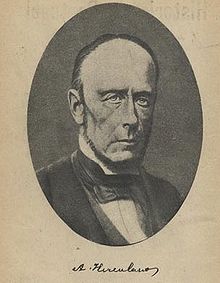Alexandre Herculano
| Naissance |
Lisbonne, |
|---|---|
| Décès |
Santarém, |
| Activité principale |
| Langue d’écriture | Portugais |
|---|---|
| Mouvement | Romantisme |
| Genres |
Œuvres principales
- História de Portugal, 1846-1853
- História da Origem e Estabelecimento da Inquisição em Portugal, 1854-1859
- Portugaliæ Monumenta Historica, 1856-1873
- Eurico, o Presbítero, 1844, roman historique
Alexandre Herculano de Carvalho e Araújo, né à Lisbonne le et mort à Santarém le , est un écrivain portugais de la mouvance romantique.
Biographie
[modifier | modifier le code]Poète, romancier, nouvelliste et dramaturge, il est également reconnu comme un historien «rigoureux et novateur[1] » et un journaliste influent, promoteur des idées libérales dans son pays.
Marqué dans sa jeunesse par les invasions françaises, la domination des Anglais et surtout par les idées libérales venues principalement de France, il joue un rôle important dans l'évolution des idées qui conduisent à la révolution de 1910.
Hommages
[modifier | modifier le code]Un grand nombre de villes du Portugal honorent le nom d'Alexandre Herculano : Lisbonne, Porto, Albufeira, Coimbra, etc.
Une statue représentant Alexandre Herculano en pied, exécutée en 1945 par le sculpteur portugais Salvador Barata Feyo (1899-1990) a été inaugurée le sur l'Avenue de la Liberté à Lisbonne, en même temps que celle de Almeida Garrett, autre grande figure du romantisme portugais.
Le tombeau d'Alexandre Herculano repose dans la salle capitulaire du cloître du Monastère des Hiéronymites, à Belém.
-
Plaque de rue à Souré.
-
Statue par Salvador Barata Feyo, avenue de la Liberté à Lisbonne.
-
Tombeau d'Alexandre Herculano.
Œuvres traduites en français
[modifier | modifier le code]- Eurico, roman-poème [« Enrico o presbytero »] (trad. du portugais par David A. Cohen), C. Leroy,
- Légendes et récits du Portugal [« Lendas e narrativas »] (trad. du portugais par Diogo Quintela et Bernard Tissier, ill. Marion Duval), Paris, Chandeigne, , 381 p. (ISBN 978-2-915540-12-3, BNF 40140100)
Notes et références
[modifier | modifier le code]- Ronny A. Lawton, « Herculano, Alexandre (1810-1877) », sur universalis.fr (consulté le )
Annexes
[modifier | modifier le code]Bibliographie
[modifier | modifier le code]- Ronnie A. Lawton, « Herculano Alexandre (1810-1877) », dans Encyclopædia Universalis, Paris, Encyclopædia Universalis, (ISBN 978-2-85229-551-3, lire en ligne).
Liens externes
[modifier | modifier le code]
- Notices dans des dictionnaires ou encyclopédies généralistes :
- [article] « Alexandre Herculano », sur wikiberal.org (consulté le )
Text is available under the CC BY-SA 4.0 license; additional terms may apply.
Images, videos and audio are available under their respective licenses.




